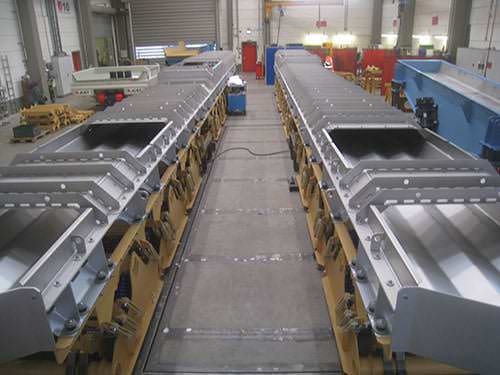RECYCLING, JOEST
Heating Up International Cooperation

JOEST US was approached by one of the world’s leading scrap aluminum companies to provide ideas on how to solve some aluminum handling challenges – Shredded alumium is processed and melted for further processing.
The inquiry started out as a request for simple feeders and screens. Once the customer realized the breath of JOEST’s equipment offerings, international manufacturing capabilities, scrap material experience and hot metal handling expertise, the opportunity quickly elevated to providing all the vibratory equipment for the line including specially-designed long vibrating conveyors (Type FSM), screens and feeders.
The customer’s facility, located in the Middle East, was having significant performance issues. They became very frustrated with the original equipment supplier’s inability to fix their equipment problems. This escalated into understanding that the line itself was poorly designed, and that even getting the equipment operating properly was not going to solve all the challenges. So the customer decided to start over with developing a whole new concept for the line. In stepped JOEST.
The first challenge was recognizing the need to eliminate the sand contamination from the shredded product. Then the sand had to be removed. This was easily accomplished by JOEST using a hybrid feeder screen. By adding a screen deck to a vibrating feeder JOEST was able to eliminate a substantial amount of sand without having to add a separate, additional dedicated screen.
The more challenging issue was how to cost effectively keep the 480°C (900°F) scrap aluminum hot as it is transported a considerable distance from the label/decoration flash-off furnace to the smelting pot. The flash-off furnace burns off any paper, plastic and/or printed labels so that they don’t contaminate the end product. This furnace consumes a significant amount of energy and imparts it into the scrap. Letting the hot scrap cool as it is transported would mean additional energy would have to be added later to get the scrap to the melting temperature.
While cooling and heating materials are common applications for JOEST’s foundry, steel and chemical design engineers using covered conveyors, maintaining the heat is a little bit more challenging. As the material is transported, or potentially stopped and accumulated on the conveyor, the internal temperature can rapidly rise. Because of this the machines are specially designed and provided with heatresistant isolations.
This opportunity started out with JOEST US proposing to directly design and manufacture simple feeders and screens. It took a cooperative effort by both JOEST US and JOEST Germany to identify the root cause of the issues and solve them in a cost-effective, reliable and innovative manner. This involved successful, close cooperation on the engineering and manufacturing levels across multiple worldwide locations to make the customer extremely satisfied.
Weitere Beiträge
As part of the JOEST group, MOGENSEN has been a trusted provider of high-performance screening and sorting technologies for many years. The new website now showcases this expertise more clearly and with a modern touch.
On International Women’s Day, we celebrated the great women in our company who have made a significant contribution every day with their commitment, expertise and passion. Their efforts have been a driving force behind our success and an inspiration to us all.
JOEST South Africa was commissioned to manufacture and supply replacement vibrating feeders for a critical power generation facility. The new units are designed to replace equipment that had been in operation for over 20 years, ensuring the continued reliability and efficiency of the plant.
MOGENSEN joins China’s food security project as an official supplier, supporting the nation’s plans to strengthen domestic grain production capabilities. The appointment by COFCO, China’s largest state-owned agricultural company, includes the deployment of multiple precision screening systems for processing rice, wheat and soybeans, among other grains. This long-term initiative is in line with China’s new food security law, which went into effect on June 1, 2024.





